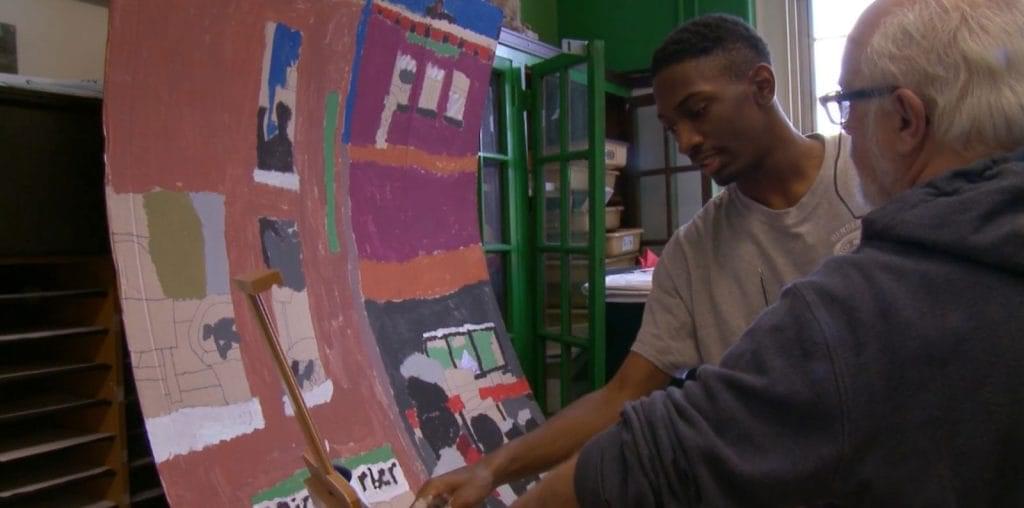
Others can try to describe a movie to you, but often you’re never going to understand what they mean until you see it for yourself. Japanese cinema is generally like that. Believing all of that nation’s films are represented by the works of Kurosawa or Oshima is the same as stating that all American films are like those of Spielberg and Scorcese. There’s a whole range of styles and subject matter, some of which you just won’t find in the U.S. There are many films, quite popular and revered in Japan, that an American audience can only look upon with shock, confusion, and concern for the mental health of the filmmakers. One such masterpiece is “Jigoku”. I don’t know if any warning could have done it justice (but I’ll try).
The star of this morality tale is Shigeru Amachi as Shiro, who at first appears to be quite the virtuous, handsome young man. A top student at a Tokyo university, he has just asked one of his professors for the hand of his beautiful daughter, Yukiko, in marriage. Shiro’s got a couple of problems, though. First, he and the future wife have been getting it on ahead of time. Apparently this is a big no-no. Second, his best pal is Tamura (Hiroshi Hayashi).
Now, Tamura is definitely a good time, but a very, very bad friend. He also has the weird habit of knowing everything about everyone and just appearing in the room when you least expect it. When Tamura takes Shiro out on the town to celebrate his engagement, they accidentally kill someone. Though it would seem like they’ll get away with it, karma seems to have other ideas. Everyone eventually ends up at the decrepit retirement home run by Shiro’s lecherous father, and then they all die. Following this turn of events, the cast gets to spend the last act of the film in HELL.
Here’s the point to the whole movie and the source of its legend. Writer/director Nobuo Nakagawa combines aspects and mythology of both the Buddhist and Christian concepts of Hell, with more than a touch of “Dante’s Inferno” and a reference to “Faust” thrown in. Shiro awakens in the afterlife on the shore of the river Styx to embark on a guided tour of the eight levels of this underworld. Along the way we witness the grisly torments inflicted upon Shiro and everyone else in the movie and our poor young hero also learns of some touchy family “situations” that he had not been aware of…and that’s it, they’re in HELL.
Wow. This film (especially the hell sequence) is lurid, pretentious, pious, and it would seem, completely heartfelt. Now, I’m not so familiar with the details of Buddhism, but I am reminded of a couple of other, similar things. I was raised in an Evangelical Fundamentalist church in West Virginia. Folks there tend to take the Bible rather literally, with the emphasis placed on burning specific images into your young brain. Every once in a while we’d get to see some “Christian educational” films. The best description I can give to those who have not seen them would be to take a 1970’s era driver’s education movie and substitute sinning for inattentive driving. The Christian flicks are about that subtle, as is “Jigoku”.
While that covers style, the nature and delicacy of the morality tale itself is at the level of the disturbing little comics published by Christian zealot/nutjob Jack Chick. If you are unfamiliar with his oeuvre, click [ here ] for enlightenment.
The members of the audience with whom I saw this picture were alternately stunned and laughing. Shiro’s only sins appear to be some pre-marital nookie and being ineffectual at halting the sins of those around him. Karma appears to be a cruel and unforgiving mistress. It’s hard to tell what was going through the director’s head. This film was made in Japan in 1960. It has beautiful cinematography. It also has nudity, violence, and the amount of gore you might expect from a Herschell Gordon Lewis movie. Nakagawa uses adult themes and elements with the kind of story and simple, unyielding morality you use to scare ten-year-olds into behaving. The director’s piety, conviction, and brow-beating only appear silly and irrational. Not everything even appears to have a point, as some of the revelations in Hell turn the whole affair into a Tennessee Williams parody that’s never going to be resolved.
Hey, at least it’s different, and that’s usually a plus (though for any Japanese film that sounds a little weird and extreme, don’t even think about bringing a date). Japanese cinema can offer the Western film enthusiast many new pleasures, but quite a few landmines. Any offerings from filmmakers other than Kurosawa and “Beat” Takeshi are rarely screened in the U.S., and when they are, they never ever seem to make any money. Internet coverage is limited, even for many of the most popular contemporary directors as web access is limited and expensive in Japan. Depth of coverage from this side of the Pacific is quite limited. I had read what I could about “Jigoku” before-hand, but the only real test is to pay your 7-10 bucks and take your chances. When you reach out to something different, your hand may come back holding a delicate orchid. It might also come back with an exploding cherry bomb. Either way the smell will stick to your clothes for awhile. If you don’t take that chance, your duds are only going to smell like you. You eventually have to cover that up with something.
